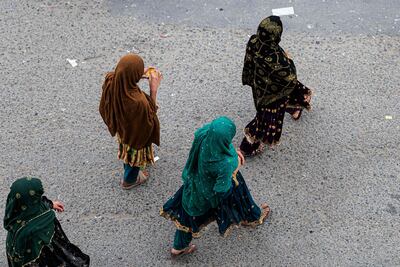The UN Security Council unanimously adopted a resolution Thursday demanding that the Taliban “swiftly reverse” all restrictions that violate the rights of women and girls in Afghanistan.
In early April, the Taliban banned Afghan women from working in UN offices nationwide.
The world body warned that the ban could paralyse desperately needed aid deliveries and could lead to the UN leaving the country.
The resolution which was drafted by the UAE and Japan was co-sponsored by 92 states including 28 member states of the Organisation of Islamic Co-operation.
It urged all UN member nations to use their influence to promote “an urgent reversal” of the Taliban’s policies and practices towards women and girls and said the ban “undermines human rights and humanitarian principles”.
Lana Nusseibeh, the UAE's ambassador to the UN, told council members: “The world will not sit by silently as women in Afghanistan are erased from society.”
By adopting this resolution, stressed Ms Nusseibeh, the council is sending an unequivocal message of condemnation and a clear call for the swift reversal, not only of this latest ban, but of others restricting the rights of women and girls in Afghanistan.
She said the restrictions “put the very presence of the UN in Afghanistan in jeopardy”.
Deputy US ambassador to the UN Robert Wood praised Muslim-majority countries for speaking out against the “Taliban’s rationale” to ban women from “universities; to keep secondary schools closed to girls; and to prevent Afghan women from working with NGOs, the UN and in nearly every sector of the economy”.
“And now the Security Council has condemned the Taliban,” he said.
Even though Russia voted in favour of the resolution, ambassador Vasily Nebenzya shared his disappointment that “a more ambitious approach and texts were blocked by western colleagues”.
He also called for the return of the $7 billion Afghan central bank assets frozen by the US following the Taliban takeover “without any preconditions”.
Late last year, the US said it had created an Afghan Fund with Swiss banks to distribute half of that sum as aid for Kabul.
No aid has yet been disbursed from the fund, pending assurances from the Taliban that the central bank is independent from the group.
On Monday, UN Secretary General Antonio Guterres will be hosting a two-day international meeting in Qatar for envoys to Afghanistan to try to find a “durable way forward” for the war-torn country.
Ms Nusseibeh told reporters the resolution sends a “clear signal going into that meeting of the position of the international community, of international law and of the Security Council on the essential role of women and girls and the role they play in every society, including in Afghanistan”.
She said this is the first time “that has come up in a UN Security Council resolution”.
The resolution stressed the urgent need to address “the dire economic and humanitarian situation” in the country and reiterated that women are essential to the delivery of humanitarian aid.
It also reaffirmed the UN's support for “a peaceful, stable, prosperous and inclusive Afghanistan” and for an “inclusive Afghan-led and Afghan-owned determination of the country’s political future and development path”.
Joyce Bukuru, senior advocate at Amnesty International, said in a statement that the resolution “must be accompanied by maximum international pressure that sends a clear message to the Taliban that the rights of women and girls are not up for negotiation — they are universal and inalienable”.
On Friday, the Taliban said the decision to ban Afghan women from working for the UN was an “internal social matter”.
“We remain committed to ensuring all rights of Afghan women while emphasising that diversity must be respected and not politicised,” the Taliban's foreign ministry said in a statement.
The Taliban regained power over Afghanistan in August 2021 after the western-backed government collapsed, following the withdrawal of US and allied forces.



